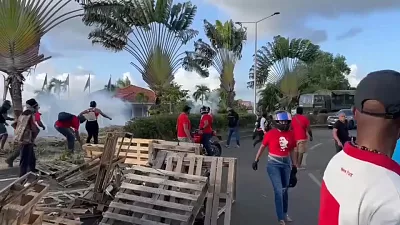Ongoing Unrest in Martinique Despite Curfew Measures
3 min read

Unrest continues to plague the French Caribbean island of Martinique, where recent demonstrations have escalated in response to the high cost of living. Protesters targeted the island’s main airport on Thursday, signaling a renewed wave of discontent that has gripped the territory.
In light of the escalating violence, the government has implemented a curfew from 9 PM to 5 AM, prohibiting demonstrations on public roads. Local media reports have documented scenes of looting, highlighting the seriousness of the situation. As tensions rise, schools have been temporarily closed, and the local teaching hospital has activated its emergency plan, known as Plan Blanc. This plan allows for the postponement of surgeries and the mobilization of additional medical personnel to handle the crisis.
The current unrest is not an isolated incident but part of a broader pattern of protests in Martinique over the past few years. Many demonstrators are voicing their frustrations over economic, social, and racial inequalities that have persisted on the island. According to statistics from 2020, approximately 27% of Martinique’s residents lived below the poverty line, a rate that is 12 percentage points higher than that of mainland France.
The latest protests began in early September, fueled by rising discontent with the cost of living, which has been exacerbated by various socio-economic challenges. In response to the unrest, national authorities dispatched special anti-riot police to the island in an effort to restore order.
Negotiations are currently underway, involving national and local authorities, the RPPRAC (the organization leading the protests), and CMA-CGM, the primary shipping carrier serving the region. These discussions aim to address the underlying issues that have led to the unrest and seek to find a resolution that satisfies all parties involved.
The protests have drawn attention to the disparities that exist not only within Martinique but also between the island and mainland France. Demonstrators argue that the cost of living is disproportionately high, particularly when compared to wages and economic opportunities available to residents. This sentiment is compounded by a feeling of neglect from the French government, leading to heightened frustrations among the populace.
Local activists and residents have been vocal about their demands for greater economic equity and social justice. Many are calling for policies that would alleviate the financial burden on families struggling to make ends meet, such as subsidies for essential goods and improved access to affordable healthcare. The impact of the pandemic has further exacerbated these issues, leaving many in Martinique feeling vulnerable and overlooked.
As the curfew takes effect and protests continue, the situation remains tense. Community leaders and activists emphasize the importance of dialogue and negotiation in resolving these issues. They argue that sustainable solutions are necessary to address the root causes of discontent and prevent future unrest.
While the government’s response has focused on maintaining order through curfews and police presence, critics argue that this approach does not address the underlying grievances that have fueled the protests. Many residents are hopeful that the ongoing negotiations will lead to meaningful changes that address the economic and social disparities on the island.
The unrest in Martinique serves as a reminder of the broader challenges faced by Caribbean territories and their relationship with colonial powers. As the situation develops, it remains crucial for all stakeholders to engage in constructive dialogue and work towards a more equitable future for the island’s residents.
In the coming days and weeks, the world will be watching closely as the negotiations unfold. The hope is that a resolution can be reached that not only restores calm but also sets the stage for lasting change in Martinique’s socio-economic landscape.